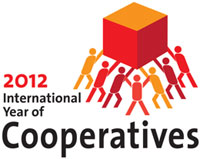Since the founding of our country, the cooperative business model has helped people with similar interests reduce risk, increase bargaining power and improve income. Today, cooperatives show up in many sectors of the economy, but they are particularly widespread in the agriculture industry, where nearly 3,000 farmer co-ops add real value to millions of farmers, ranchers and rural communities across the country.
In recognition and celebration of the benefits cooperatives of all types deliver to the communities they serve, this year has been officially declared the International Year of Cooperatives by the United Nations General Assembly and the U.S. Senate. As a nationwide network of cooperatively owned lenders, the Farm Credit System joins in that celebration.

One of the things that makes cooperatives unique is that they are governed by a set of principles that have not only withstood the test of time, but also serve as the basis for value creation to the members and communities they support:
Voluntary and Open Membership
Cooperatives are voluntary organizations, open to all people able to use their services and willing to accept the responsibilities of membership, without gender, social, racial, political or religious discrimination.
Democratic Member Control
Cooperatives are democratic organizations controlled by their members, who actively participate in setting policies and making decisions. The elected representatives are accountable to the membership. Members have equal voting rights — one member, one vote.
Members’ Economic Participation
Members contribute equally to, and democratically control, the capital of the cooperative. This benefits members in proportion to their transactions with the cooperative rather than to the capital they have invested.
Autonomy and Independence
Cooperatives are autonomous, self-help organizations controlled by their members. If the co-op enters into agreements with other organizations or raises capital from external sources, it is done so based on terms that ensure democratic control by the members and maintain the cooperative’s autonomy.
Education, Training and Information
Cooperatives provide education and training for members, elected representatives, managers and employees so that they can contribute effectively to the development of their cooperative. Members also inform the general public about the nature and benefits of cooperatives.
Cooperation Among Cooperatives
Cooperatives serve their members most effectively and strengthen the cooperative movement by working together through local, national, regional and international structures.
Concern for Community
While focusing on member needs, cooperatives work for the sustainable development of communities through policies accepted by their members.
The stories in this edition of Landscapes are a great reminder of the ingenuity, vision and determination that abound in today’s agriculture industry, and the role that co-ops play in rural America. Farm Credit is proud to be a part of the agriculture industry as a reliable and competitive source of credit to its members. We are equally proud of our cooperative heritage, the principles that guide us as a cooperative, and the abundant bounty we help produce through the industry we serve.
-Stan Ray